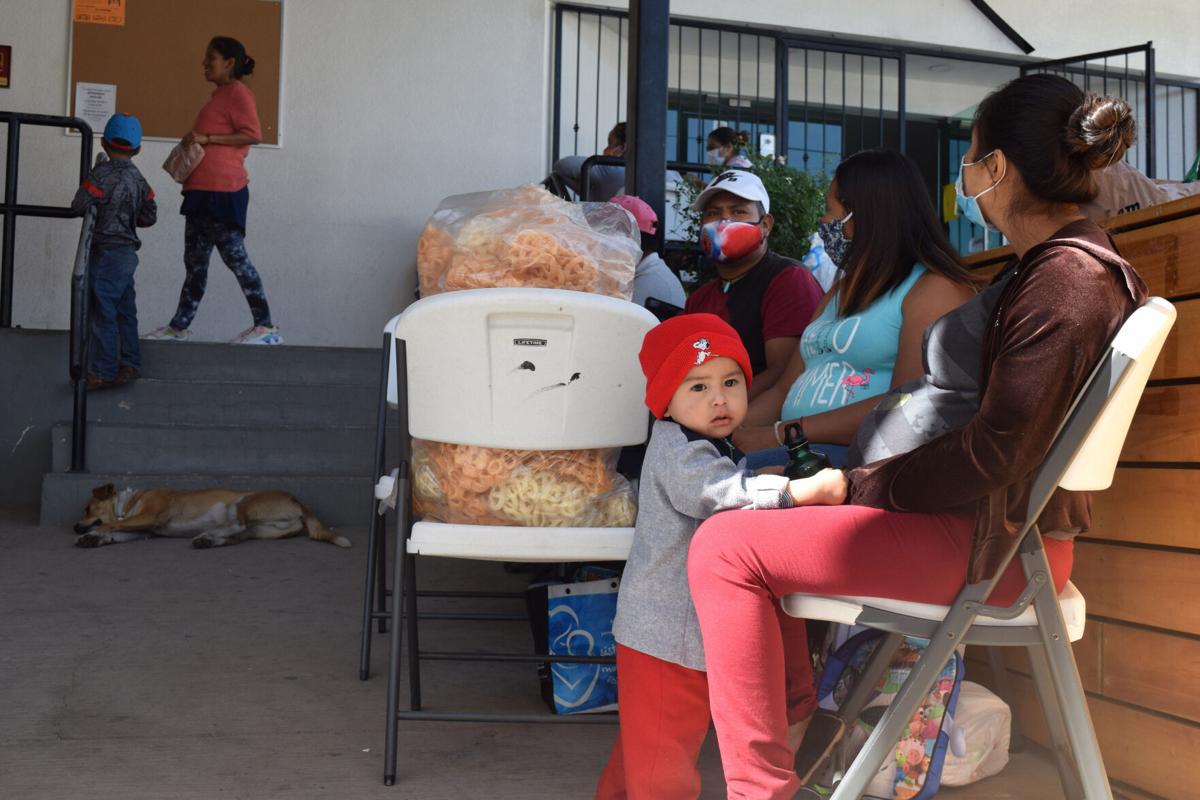The number of migrants arriving in Nogales, Sonora, who say they are fleeing violence or persecution increased in 2022, according to a report by the Kino Border Initiative.
About 75% of people arriving at Kino’s help center in 2022 reported violence or persecution as their primary reason for migrating, a significant increase from the 39% in 2020 and 67% in 2021, the migrant-aide organization in Nogales, Sonora, found.
About 20% of people who arrived at Kino said they migrated for economic reasons, four percent said they did so to reunite with family and one percent cited other reasons, the report says.
The nonprofit’s recently published 2022 Congressional Year End Report includes information from an intake survey completed by each person who receives services.
In 2022, an average of 500 migrants a month came to the center in Nogales, Sonora, totaling more than 6,000 people over the year.
Migration trends have been shifting over the last few years. While the majority of migrants crossing unauthorized at the U.S.-Mexico border historically were from Mexico and the Northern Triangle — Guatemala, Honduras and El Salvador, over the last few years there has been a huge increase in migrants coming to the U.S. from countries that are much farther away, as political, civil and economic unrest grows in the Western Hemisphere and throughout the world.
In Arizona the proportion of people from Mexico and the Northern Triangle apprehended at the U.S.-Mexico border went from 92% in fiscal year 2020 to 47% in 2022, and 40% in the first three months of fiscal year 2023, with large numbers of migrants coming from countries like Cuba, Peru and Colombia, according to data from U.S. Customs and Border Protection.
Regulations like public health policy Title 42, originally put in place because of the pandemic and used to quickly expel migrants from the country, blocked the ability to arrive at the border and ask to make an asylum claim, especially for migrants from Mexico and the Northern Triangle, who were easier to expel.
“Due to Title 42, people fleeing violence and persecution were unable to seek asylum at the border, and asylum-seekers were forced to wait in Mexico or attempt unauthorized crossing and possible expulsion back to Mexico,” the report says.
The report adds that Title 42 empowered criminal networks who smuggle people across the border as more migrants looked for alternative ways to cross, a sentiment shared by many migration experts.
While a smaller portion of people from Mexico were apprehended at the border than previous years, the number of people internally displaced within Mexico still increased, reflected in the demographics of people at Kino.
In 2022, 78% of migrants who came to Kino were Mexican and 22% were non-Mexican, while in 2021 and 2020, the percentage of Mexican migrants was only about 58%.
A disproportionate number of people at Kino are from the Mexican state of Guerrero, which has experienced increasing levels of violence. In 2022, 53% of Mexican nationals at Kino were from Guerrero.
While nearly 2,500 people from Guerrero arrived at Kino over the year, only 371 and 303 people came from the two states with the second and third largest representation, Michoacán and Chiapas, respectively. The proportion of Mexicans from Guerrero was only 19% in 2020.
Another key finding of the report was that violence against women and girls continues to be a key driver of migration from Mexico and Central America. Women frequently report experiencing sexual violence on their journey to the U.S.-Mexico border or while crossing into the United States, the report said.
During one two-week period last summer, 55% of people who arrived at Kino were women or girls, and 87% cited violence or persecution as their main reason for migrating. They reported domestic abuse, threats, sexual assault, rape and kidnappings, the report says.
The report also details migrants’ accounts of abuses and dangers while traveling to the border and while waiting in Mexico, as well as experiences with being expelled and deported from the U.S. and the Kino Border Initiative’s recommendations to Congress.
The number of people crossing the U.S.-Mexico border without prior authorization decreased in January, after President Joe Biden announced an expansion to Title 42 to include expulsions of people from Nicaragua, Cuba and Haiti, as well as Venezuelans, who were being expelled in larger numbers since October.
The Biden administration also expanded paths of legal migration to people from those four countries as well as a small expansion to people from other countries being allowed to come into the country to claim asylum.
The number of people apprehended at the border nationwide in January fell to the lowest it had been in nearly a year, according to Customs and Border Protection data released Friday afternoon. The number of people using the migrants services in Pima County fell in January as well.
While the county received a record number of migrants in December, at more than 15,000 people, that number dropped to significantly in January and has continued to drop in February.
With the record number of people in December, the county was “completely overwhelmed” and dangerously close to turning people away, said county spokesperson Mark Evans. But they worked with the city in order to utilize more hotels to increase bed capacity, something that would not have been possible if the surge of migrants had continued into January and February when the city is full of visitors for the Tucson Gem and Mineral Show.
Haitians seeking to escape from poverty and uncertainty are flocking to the main migration office in the capital Port-au-Prince hoping to get a passport and perhaps their ticket to life in America under a new US immigration program. Under the policy announced by President Joe Biden, the United States will accept 30,000 people per month from Haiti and a handful of other countries mired in crisis, on the condition that they stay away from the overcrowded US border with Mexico and arrive by plane.





